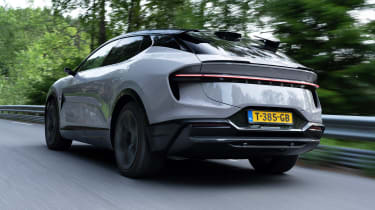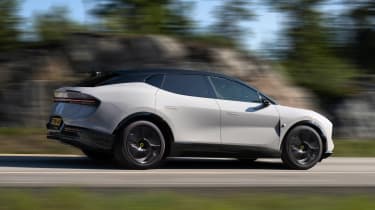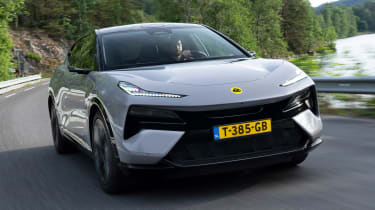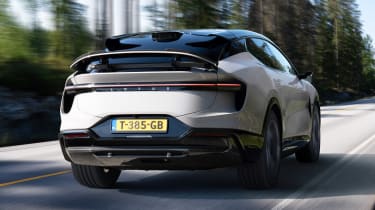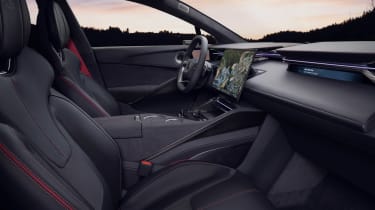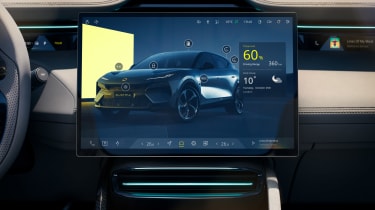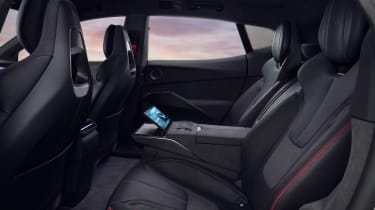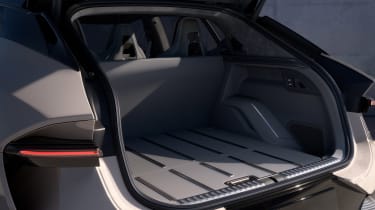Lotus Eletre SUV review
“A big electric SUV from Lotus sounds like it shouldn’t work, but somehow, it really does.”
Pros
- Sensational to drive
- Posh-feeling interior
- Lots of space
Cons
- Door cameras feel awkward
- Sport mode can be a bit much
- Smaller boot in four-seat guise
Verdict - Is the Lotus Eletre a good car?
From the moment it was announced, the cynics had the knives out for the Lotus Eletre. After all, how could an enormous electric SUV ever be a ‘proper’ Lotus? Well, the British firm, under the stewardship of Chinese parent company Geely, has truly confounded the doubters. Importantly for buyers, this is a high-quality, practical family car with lots of space, a posh interior and lashings of luxury kit. However, it’s also one that delivers enough pace, engagement and excitement to be worthy of the Lotus name.
Lotus Eletre models, specs and alternatives
Lotus is a carmaker that’s going through a lot of change right now, and that’s probably why the Eletre feels like such a departure for the company. Most will know that Lotus is famous for the many sports cars it has built over the decades, and those continue today with the Emira, a petrol-powered sports car, and the Evija, an all-electric hypercar.
 Best luxury SUVs to buy in 2025
Best luxury SUVs to buy in 2025
The Eletre, meanwhile, is a new kind of car for a new kind of Lotus. After all, every car buyer seems to want an SUV these days, and electric cars are the future, so any car company with any intention of surviving simply has to get on board with market trends. Enter the Eletre, an all-electric high-performance SUV, and one that not only has to check all the necessary boxes, but also has to feel like a Lotus.
That’s a big ask for Lotus. After all, big, tall, heavy electric SUVs go against pretty much every sacred engineering principle the company was founded on. However, when you’re charging between £90,000 and £120,000 for a car, you really need to deliver on what your buyers want.
In order to deliver on the performance aspect necessary in the Lotus recipe, two powertrains are offered, both fed by a 112kWh lithium-ion battery, and both of which feature a pair of electric motors, one driving the front wheels, and one driving the rears. In the basic Eletre and the mid-range Eletre S, these motors combine to produce 595bhp, while in the range-topping R version, you get a more powerful rear motor which hikes the combined output to 893bhp. As you’d expect, those numbers have the performance box well and truly ticked, and instantly give the Eletre credibility among rival high-performance luxury SUVs, be they powered by electricity, combustion engines, jet fuel, or anything else.
|
Trim levels |
Power options |
|
|
Lotus Eletre alternatives
As a large, all-electric, performance-focused luxury SUV, the Eletre currently has very few direct rivals, but we don’t expect that to be the case for long. However, if you’re not absolutely 100% sold on pure electric power, or your electric car doesn’t absolutely have to be an SUV, then there are lots of other sporty and luxurious cars that will compete for your money.
Electric SUVs
Like we’ve said, large, luxurious SUVs powered purely by electricity aren’t in plentiful supply, but we can think of a few. All of them go like stink, but none quite matches the Eletre’s sporty attitude.
Performance SUVs
If you don’t find it unthinkable that your prestige sports SUV is powered by a combustion engine, then there are plenty of rival SUVs that deliver high-performance thrills.
Electric luxury cars
If your high-end luxury electric car need not have the tall body, raised ride height and lofty driving position of an SUV, then there are plenty of other premium electric car options that deliver big on both style and performance.
Range, charging & running costs
The official range of the Eletre and Eletre S versions is given at an impressive 373 miles, while on the more powerful R, that figure drops down to 304 miles. And our test drive would suggest that those figures could be reasonably plausible: after 240 miles, some of them placid and some of them not-so-placid, we still had around 20% of the battery left. As ever, expect high-speed driving and cold weather to reduce the range you get in the real world.
If you can find a 350kW rapid charger – these do exist in the UK but they’re still very rare – then Lotus claims your battery will go from 10-80% in just 20 minutes. That’s because the Eletre has a beefy 800-volt electrical system that allows it to utilise such high charging speeds. We haven’t seen any figures for how long the car takes to charge in more domestic settings, but with a battery the size of the Eletre’s, we reckon you’ll be looking at a full overnight charge on a 7kW wallbox. At least that’ll be much, much cheaper than using a rapid charger, and for that matter, much cheaper than putting petrol in one of the Eletre’s combustion-engined sports SUV rivals. The CCS charging port – which is becoming the industry standard and is as such compatible with the vast majority of public charging points – is located on the front wing on the left-hand side of the car.
Of course, the Eletre is a predictably expensive car to buy, with the base car costing around £90,000, the S costing around £105,000 and the R a whopping £120,000. We doubt the Eletre will appear on many approved company car lists, either, but on the off-chance it appears on yours, you could get one for a comically low amount in terms of monthly benefit-in-kind tax bills, as company car tax rates are super-low on electric cars, and will stay that way for the foreseeable future.
We haven’t seen any figures for depreciation on the Eletre yet – it’s too new for that – but although expensive high-performance SUVs tend to suffer quite heavy depreciation, this is a very different type of expensive high-performance SUV, so it’s possible – if not entirely likely – that the Eletre could avoid following that trend. We’ll have to wait and see.
|
Model |
Battery size |
Range |
|
Eletre |
112kWh (109kWh usable) |
373 miles |
|
Eletre S |
112kWh (109kWh usable) |
373 miles |
|
Eletre R |
112kWh (109kWh usable) |
304 miles |
Insurance
Insurance groupings haven’t technically been announced for the Eletre just yet as it is too new. However, when you’re talking about a car that’s this expensive and this powerful, it’s a pretty safe bet that it’ll be a top-end group 50 car, meaning premiums will be about as expensive as they can get. The thing is, that’ll be the case for all this car’s high-performance SUV rivals, too, electric or otherwise.
Electric motor, drive & performance
It’s on the road where any Lotus must deliver more than anywhere else, and it’s in that area where you wouldn’t blame the company’s engineers for feeling a little daunted. You see, Lotus is a company that, since its inception, has engineered cars on the principle “Simplify, then add lightness”. However, it’s pretty much impossible for even the brightest engineer to add much lightness to a hulking SUV with a dirty great battery pack in it, so rather than simplifying, Lotus needed to throw technology at the Eletre to give it any chance of having the dynamic ability it should. Not exactly Lotus’ wheelhouse, then.
It’s even more impressive, then, that the company has done such a spectacular job with the Eletre. Sure, it’s not a driving experience that screams traditional Lotus at you – hardly a surprise when the Eletre weighs more than 2.5 tonnes – but the car does display a number of traits that make it recognisable as a Lotus, and that in itself is a minor miracle.
First up, we should be very clear about the precise nature of the car we drove. It was a mid-range S version, which like all other Eletres gets standard air suspension, but it’s important to note that it had also been specified with the Lotus Dynamic Handling Pack, which comprises sophisticated active anti-roll bars and active four-wheel steering. This pack is standard on the R version, but on the other two, it’s a very pricey optional extra at almost seven grand, and it’ll have a significant effect on how the car drives.
But with it fitted, we can confirm that the Eletre is gob-smackingly good. Any Lotus needs to handle well, and on that score, the Eletre is fabulous. With standard four-wheel drive and the same amount of power at both ends of the car, it feels very neutral indeed and there’s certainly no shortage of grip or traction. Attack a corner, and the body stays impressively flat and controlled, helping towards the impressive feeling of agility. And yet despite that control, the suspension also delivers a plush-feeling ride that wouldn’t feel out of place in a luxury limousine.
The steering is the bit that really marks the Eletre out as a Lotus, though. It’s quick, at just 2.5 turns lock-to-lock, and there’s an instant response as you nudge the wheel away from the straight-ahead position that gives that classic Lotus feeling of urgency, accuracy and engagement.
And, bear in mind, all this comes with the car set to its default Tour mode. Flip it into Sport mode, and things instantly become more aggressive. The throttle becomes more sensitive, the steering becomes weightier and the suspension hunkers down. Ride comfort is compromised a little as a result, but it still suppresses bumps well enough. Importantly, the switch in character feels convincing and gives the car an appealing duality.
0-62mph and top speed
The twin electric motors on the Eletre and Eletre S models combine to give a total output of 595bhp. That’s a lot, enough to propel this 2.5-tonne car from 0-62mph in just 4.5 seconds. And if that sounds fast, we can certainly confirm that it feels fast, too.
The eagerness with which the Eletre’s pace is unfurled depends on which of the various driving modes you select. Select Range and the throttle response is quite gentle and measured. Dial it up to Tour mode using the lovely milled aluminium button on the centre console, and you get a more urgent response from the accelerator pedal, which makes the car instantly feel more lively. Dial it up a notch further to Sport mode, and the throttle response becomes borderline explosive. In fact, it’s so aggressive that it can be a little unsettling in some situations, and it all feels a bit unnecessary, so we reckon that Tour mode is where you’ll want to spend most of your time.
We also had a quick shot in the Eletre R, which has a far more powerful motor applied to the rear axle, and this hikes the total out up to 893bhp. Predictably, the R’s performance is even more bonkers, with the 0-62mph dash being dispatched in just 2.9 seconds. And while you can certainly feel the elevated level of urgency in the R, we think that there will be very few people for whom the less powerful versions aren’t fast enough.
|
Model |
Power |
0-62mph |
Top speed |
|
Eletre |
595bhp |
4.5 sec |
160 mph |
|
Eletre S |
595bhp |
4.5 sec |
160 mph |
|
Eletre R |
893bhp |
2.9 sec |
160 mph |
Interior & comfort
Lotus has plenty of experience in making cars that look the bee’s-knees from the outside, but in years gone by, the firm’s interiors have never quite had the same impact, with signs of cost-saving and corner-cutting being all too evident. In some ways, then, the Eletre’s interior could be the strongest sign of all that this car is all about Lotus leaving its past behind. By any measure, the Eletre’s cabin is absolutely stunning.
All the materials – whether in your direct eyeline or not – look and feel properly posh, with plenty of stitched suede-effect alcantara used to mix things up on the texture front. Everything appears to be assembled with a tight and substantial feel that comes across as – dare we say it – quite Germanic. Best of all are the various switches, many of them tactile metal items that move and click into place with satisfying precision.
In terms of design, it feels very modern and minimalist, as is the fashion. Most functions are operated through the 15-inch touchscreen (we’ll come to that in more detail in a minute), resulting in a clean, uncluttered feel. There’s a small and unconventionally narrow strip of digital screen on the dashboard, just behind the steering wheel, that displays your driving information, but that’s not a problem because most of the important information delivery comes courtesy of the large 29-inch head-up display that beams everything you need onto the windscreen directly in front of your eyes.
The Eletre gets electrically adjusting door mirrors as standard, but as an (expensive) optional extra, you can replace these with rear-facing cameras that project their image onto a screen set into the top of the door trim, just below where a conventional mirror would sit. The thing is, your eye is naturally drawn to that place where a conventional mirror would sit, meaning that every time you flick your eyes to the screen, you have to adjust where you’re looking. That makes you feel like you don’t entirely trust the system. Sure, it might be one of those things that you get used to over time, but for us, the whole thing feels like a needlessly complicated solution to a problem that there’s already a very easy – not to mention, much cheaper – solution for.
Infotainment and navigation
As we’ve mentioned, infotainment duties are carried out but a 15-inch centrally-mounted touchscreen. First of all, it looks absolutely fantastic, with sharp, modern-looking graphics and slick animations. You’ll also be impressed by how slick it feels to operate, with fast responses, impressive screen sensitivity and speedy screen transitions. It’s also fairly easy to navigate your way around the system given its complexity, thanks to logical menus and layouts. If we’ve one gripe, it’s that operating a few too many of the ventilation functions involves meddling with the screen.
The standard satellite navigation system delivers clear, unambiguous commands, but with Apple CarPlay and Android Auto also provided as standard, you can turn navigation responsibilities over to your smartphone if you so wish.
Key features | |
|
Eletre
|
Eletre S (Eletre plus…)
|
|
Eletre R (Eletre S plus…)
| |
Practicality & boot space
As a purveyor of mainly lightweight sports cars and touring coupes in the past, Lotus has never been famed for the practicality of its cars. As we’ve said all along, though, the Eletre is a new type of Lotus that ushers in a new era of Lotus, so that needs to change, especially in a large SUV that well-heeled families will likely use as their everyday transport.
And happily, it really does. You can specify your large SUV with either five seats, as is conventional, or with four, where the two rear seats are separated by a fixed armrest with a nine-inch touchscreen for adjusting climate settings, seating positions and media playback. The latter option costs you a bit more. Either way, those in the back get a really impressive amount of headroom and legroom, allowing even tall passengers to stretch out in luxury.
Those up front are just as well catered for on space, and if you’re the lucky so-and-so that gets to drive, you’ll enjoy a driving position that’s absolutely spot-on. What’s more, massive amounts of electric adjustment for both the seat and the steering wheel mean that drivers of all shapes and sizes should be able to fine-tune their position just so. Your visibility is impressive clear in all directions, too: another thing that Lotus hasn’t exactly been famous for in the past.
Cabin storage is decent, with a storage tray in the centre console, along with two cupholders that sit flush with the surface of the console until they’re needed, while the front door pockets can carry a one-litre water bottle.
|
Size comparison | |||
|
Model |
Length |
Width |
Height |
|
Lotus Eletre |
5,103mm |
2,019mm |
1,630mm |
|
Audi Q8 E-Tron |
4,915mm |
1,937mm |
1,633mm |
|
BMW iX |
4,953mm |
1,967mm |
1,695mm |
|
Lamborghini Urus |
5,112mm |
2,016mm |
1,638mm |
Boot space
In terms of size, the Eletre is all-but-identical to the Lamborghini Urus, and a bit bigger than rivals including the Audi Q8 E-Tron and BMW iX. And in terms of boot space, it’s good news that the big Lotus does better than any of them. Specify your car with the standard five-seat layout (which we believe most buyers will), and you get an impressive 688 litres of cargo space with all the seats in place, compared to 616 litres in the Lambo. The Audi and BMW are further behind still, with figures of 569 litres and 500 litres, respectively. It should be noted, though, that if you specify the Eletre with the four-seater option, boot space diminishes to be virtually identical to that of the Urus.
The opening is wide and tall, allowing easy access, and because there’s virtually no load lip, there’s very little to get in your way when loading heavy items. There’s a bit of additional space under the boot floor for tucking away your charging cables, but if you prefer to keep them up front, there’s also a 46-litre ‘frunk’ under the bonnet.
The Eletre’s standard air suspension allows another cool trick. Press a button in the side wall of the boot compartment, and the back of the car drops by up to 75mm, giving you a lower load lip. It’s a neat system that any elderly family pooch will be especially grateful for.
|
Boot space comparison | |
|
Model |
Boot space |
|
Lotus Eletre (five-seat model) |
688 litres |
|
Audi Q8 E-Tron |
569 litres |
|
BMW iX |
500 litres |
|
Lamborghini Urus |
616 litres |
Reliability & safety
There’s an old joke about the Lotus moniker standing for “Lots Of Trouble, Usually Serious”, and yes, we’ve experienced plenty of build quality foibles with Lotus cars in the past, and heard anecdotal evidence of countless more. However, Lotus doesn’t sell enough cars to feature in our annual Driver Power survey, so it’s difficult for us to quantify the firm’s performance on that front in recent years that we might take clues from.
And even if we could, they would probably be completely misleading. While most Lotuses are assembled in a very large shed in rural Norfolk, the Eletre is built in a state-of-the-art factory in Wuhan, China, so few comparisons can, or should, be drawn. And besides, if you were using the Eletre’s very-un-Lotus-like perceived quality as a marker of reliability, you’d think it would last a lifetime. What’s more, Lotus offers the Eletre with an impressive five-year/100,000-mile warranty, with eight-year/150,000-mile cover for the battery.
Safety
Appropriate to Lotus’ newfound focus on technology, the Eletre comes stuffed with pretty much every driver assistance aid you can think of. There’s all the mandatory stuff such as autonomous emergency braking (AEB) and the like, but the car also comes as standard with systems such as adaptive cruise control, driver monitoring, lane keep assist, blind spot detection, front and rear cross-traffic alert, front and rear parking assistance, traffic sign recognition and rear collision warning. The car hasn’t been crash-tested by Euro NCAP, so its performance on that score remains a mystery for now.


